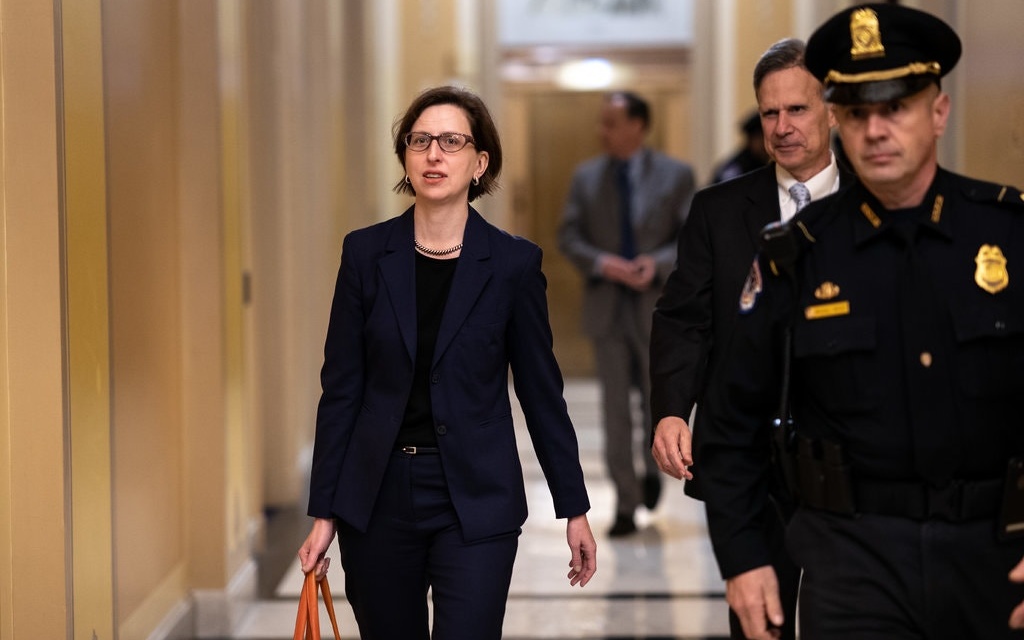Pentagon official Laura Cooper arrives on Capitol Hill last month to testify to House committees (Erin Schaff/New York Times)
Donald Trump’s defense of his pressure on Ukraine for investigations — to tarnish Presidential candidate Joe Biden and the Democrats and to cover up Russia’s interference in the 2016 US election — further crumbles with the publication of more testimony from Pentagon and State Department officials.
Laura Cooper, a senior Defense Department official for Russia and Ukraine, told House committees that the White House began asking detailed questions about military assistance to Ukraine after a meeting with Trump in mid-June.
Cooper explained that she received three inquiries soon after her office announced that the Pentagon was planning to provide $250 million to Ukraine for training and equipment. The White House asked which US industries were involved in the aid, what other countries were contributing to Ukraine, and which US agencies provided the funding.
“We got a question….from the Department of Defense, asking for follow-up on a meeting with the President,” she said.
That timing is more than a month before Trump asked new Ukraine President Volodymyr Zelenskiy, in a July 25 call, for the investigations. Days before the conversation, Trump froze $391 million in military aid to Kiev.
Cooper said she and other Pentagon officials warned the White House over the summer that denial of security assistance, approved by Congress, could violate the law as well as endanger Ukraine’s security in the face of Russian pressure and support of military operations by Ukrainian separatists.
She noted that holding up the assistance would violate the Impoundment Control Act, which bars the President from deciding unilaterally not to spend money appropriated by Congress. But the White House, through the Office of Management and Budget, repeatedly asked if the aid could be held up for a longer period.
Other current and former US officials have testified that White House Chief of Staff Mick Mulvaney, who also heads the OMB, was used by Trump to hold up the assistance. John Bolton, pushed out as National Security Advisor in September, angrily said that the National Security Council would not be part of the “drug deal” linking the aid and investigations, according to senior officials.
The military was finally released on September 11, after news began circulating of a formal complaint over the Trump-Zelenskiy call.
Concerns About Giuliani
Transcripts of testimony from Christopher Anderson and Catherine Croft, Ukraine specialists at the State Department, further depicted the White House campaign and the concern that it spurred.
Anderson spoke of Bolton’s frustration about the role of Trump’s attorney Rudy Giuliani in the pressure from November 2018 for Ukrainian investigations.
“To the best of my recollection, he made a joke about every time Ukraine is mentioned, Giuliani pops up, and that the President was listening to Giuliani about Ukraine,” the official said.
Anderson was the advisor to US envoy to Ukraine Kurt Volker, a key figure in the Trump-Giuliani campaign. He recalled his worry that Giuliani was undermining US efforts for a Russian to return to negotiations seeking an end to armed conflict in Ukraine.
“I had the fear that if Giuliani’s narrative took hold, that the Ukrainian government was an enemy of the president, then it would be very hard,” Anderson summarized.
Read Christopher Anderson’s Testimony
Croft said she was anxious about taking the post to assist Volker: “It was possible that the Trump administration would choose to change its policy to suit domestic politics.”
The advisor undercut the Trump defense that the Ukrainians did not know of the aid freeze until September, saying Kiev “found out very early on” of the suspension.

